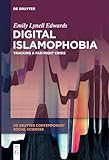Digital Islamophobia : Tracking a Far-Right Crisis / Emily Lynell Edwards.
Material type: TextSeries: De Gruyter Contemporary Social Sciences ; 21Publisher: Berlin ; Boston : De Gruyter, [2023]Copyright date: ©2023Description: 1 online resource (VI, 186 p.)Content type:
TextSeries: De Gruyter Contemporary Social Sciences ; 21Publisher: Berlin ; Boston : De Gruyter, [2023]Copyright date: ©2023Description: 1 online resource (VI, 186 p.)Content type: - 9783111032429
- 9783111032955
- 9783111032887
- 305.697
- online - DeGruyter
- Issued also in print.
| Item type | Current library | Call number | URL | Status | Notes | Barcode | |
|---|---|---|---|---|---|---|---|
 eBook
eBook
|
Biblioteca "Angelicum" Pont. Univ. S.Tommaso d'Aquino Nuvola online | online - DeGruyter (Browse shelf(Opens below)) | Online access | Not for loan (Accesso limitato) | Accesso per gli utenti autorizzati / Access for authorized users | (dgr)9783111032887 |
Frontmatter -- Contents -- Chapter I Introduction -- Chapter II From Homeland, to Heimat, to Hindutva: Profiling Far-Right Islamophobic Transnational Communities on Twitter -- Chapter III Digital Islamophobia in Play -- Chapter IV Exporting Home-Grown American Islamophobia -- Chapter V Visualizing Networks, (Mis)Information, & Islamophobia In German Networks -- Chapter VI Islamophobia & the Crisis of Conspiracy -- Chapter VII Conclusion: Digital Soldiers & Cultural Warfare -- Index
restricted access online access with authorization star
http://purl.org/coar/access_right/c_16ec
The rise of far-right communities on digital platforms is a global crisis. Digital Islamophobia tracks far-right groups where they are a virtual and vicious threat, exploring how these networks grow, develop, and circulate Islamophobic hate-speech on Twitter. Reconstructing this media ecosystem, Digital Islamophobia traces the reactionary political ideologies animating these groups through feminist data analytic techniques in a transnational study of German and American far-right, digitally networked users. This work illustrates far-right communities using data visualization techniques, identifies a taxonomy of user-types, analyzes themes and stories that motivate far-right users, and tracks the spread of linked forms of anti-Muslim sentiment, reactionary ideologies, and (mis)information. In doing so, Digital Islamophobia details how far-right discourse is not merely national, or even transatlantic, but increasingly transnationalized among American, German, as well as Indian and Nigerian digital networks. By tracking and tracing the contours of these far-right digital communities on Twitter and analyzing the content of their conversations, Digital Islamophobia provides policy-makers, researchers, and scholars with a potential road-map to stop them.
Issued also in print.
Mode of access: Internet via World Wide Web.
In English.
Description based on online resource; title from PDF title page (publisher's Web site, viewed 02. Jun 2024)


